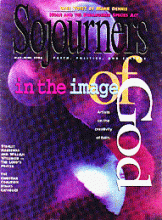Huey Long taught us that "all politics is personal." 1970s feminist activists showed us how "the personal is political." Folk musicians remind us that personal stories have political implications. But what's the best formula for these truths to be played out?
Multiple Grammy nominee Joan Osborne has
jumped from relative obscurity into the middle of the recording industry with her 1995 major-label debut, Relish (PolyGram Records). Hit single "One of Us" asks the incarnational question, "What if God was one of us/Just a slob like one of us/Like a stranger on a bus?"
According to Entertainment Weekly, "One of Us" almost didn't make the recording: Osborne wanted to highlight her own songwriting, and this pop tune was written by Eric Bazilian. Producer Rick Chertoff eventually convinced Osborne to include the song. Its wide exposure has given her original material a boost. Though the pop tunes on the recording have gotten most of the initial notice, the R & B material is actually musically more interesting.
Supported by daring instrumentation, Tori Amos purrs her way through much of her recent release, Boys for Pele (Atlantic, 1996). The recipient of critical acclaim, Amos' constant breathiness on this album is underscored by harpsichord, strings, and brass. But with lyrics that only Suzanne Vega could understand, I was left with the lingering question, Do her feet ever touch down on the real world?
The same is not true for Ani DiFranco. Her recent release, Not a Pretty Girl (Righteous Babe, 1995), doesn't fit neatly into any predictable musical category-rock, pop, folk. And the lyrics are so intimate (a la Sinead O'Connor) they're painful. At her best, DiFranco is intensely and "politically" personal. At her worst, she offers self-indulgent psychobabble, with each of her "insights" pushed upon us all. Unearthing deeply personal thoughts, she overlays her feelings to global proportions.
Read the Full Article
